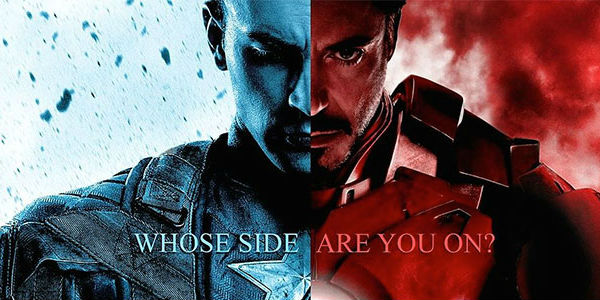I'm writing this after seeing Doctor Strange, and I'll be honest, I'm still not tired of Marvel's movies. Ever since Birdmam it seems trendy to hate on the blockbuster superhero movies, but I still find them to be quality content. Every movie has some similarities, sure, but most of those, good dialog, interesting effects, Easter eggs, etc. make for a good movie. Beyond that, Marvel has just done a good job of building a broad genre.
As time goes on and Marvel continues to dominate the subgenre, every movie, and even their growing catalog of TV shows are thematically different. For example, Antman was a heist movie, Guardians of the Galaxy was a space opera, and Doctor Strange adds wizard to the mix. Thematic diversity isn't what I'm concerned with here.
The unfortunate paradox of comic books is that the movies own Hollywood, but books are selling as bad as ever. So, in the last couple years, we've seen Marvel do some bold things with bug characters, like name Thor a woman and Captain America black, and then later a member of Hydra. You couldn't do that in most mediums without a lot of confusion, but by nature comics are absurd, so it makes some amount of sense. That has carried over to the film division.
I don't say Marvel hasn't had missteps, like making the Mandarin white in Iron Man 3 (spoilers, but that movie sucks anyway). They've really done more to progress the medium than they're given credit for.
Amidst the overwhelming white domination of the Oscar's the last few years, there's been renewed controversy over diversity in Hollywood. Liberals point to a desire and necessity to show more of the American experience, and conservatives insist on fighting PC culture.
The fight is ugly, but by cleverly raising obscure characters to prominence, Marvel has made some really cool moves. I'll start with the most high profile example I have. Samuel L. Jackson is one of the most famous actors in the world and as Nick Fury, he represents a prominent and widespread influence throughout the Marvel universe.
Here's the thing, until Jackson took on the roll, the comics always featured a white man in the comics. As a character emerging from the Vietnam era, it shouldn't be any surprise he was white, but race was never important to the character. Marvel could have stuck with cannon (maybe use Tom Hanks) and people probably wouldn't have cared. Instead, they added some color to a remarkably pale industry.
This push for diversity went unnoticed, but it shouldn't. Sure, he's still a big star, but they still succeeded in inserting a diverse character into the universe, but that wasn't even the first instance, look back to Thor for a larger example.
Thor is, obviously, based off traditional Norse mythology, and so a Frozen approach where the characters are traditional Scandinavian people would be logical. Instead, the studio acknowledged that gods operate on a different level and mysterious ways.
Is this perfect? No. But it's progress. And I'm grateful to have something.
As time goes on and Marvel continues to dominate the subgenre, every movie, and even their growing catalog of TV shows are thematically different. For example, Antman was a heist movie, Guardians of the Galaxy was a space opera, and Doctor Strange adds wizard to the mix. Thematic diversity isn't what I'm concerned with here.
The unfortunate paradox of comic books is that the movies own Hollywood, but books are selling as bad as ever. So, in the last couple years, we've seen Marvel do some bold things with bug characters, like name Thor a woman and Captain America black, and then later a member of Hydra. You couldn't do that in most mediums without a lot of confusion, but by nature comics are absurd, so it makes some amount of sense. That has carried over to the film division.
I don't say Marvel hasn't had missteps, like making the Mandarin white in Iron Man 3 (spoilers, but that movie sucks anyway). They've really done more to progress the medium than they're given credit for.
Amidst the overwhelming white domination of the Oscar's the last few years, there's been renewed controversy over diversity in Hollywood. Liberals point to a desire and necessity to show more of the American experience, and conservatives insist on fighting PC culture.
The fight is ugly, but by cleverly raising obscure characters to prominence, Marvel has made some really cool moves. I'll start with the most high profile example I have. Samuel L. Jackson is one of the most famous actors in the world and as Nick Fury, he represents a prominent and widespread influence throughout the Marvel universe.
Here's the thing, until Jackson took on the roll, the comics always featured a white man in the comics. As a character emerging from the Vietnam era, it shouldn't be any surprise he was white, but race was never important to the character. Marvel could have stuck with cannon (maybe use Tom Hanks) and people probably wouldn't have cared. Instead, they added some color to a remarkably pale industry.
This push for diversity went unnoticed, but it shouldn't. Sure, he's still a big star, but they still succeeded in inserting a diverse character into the universe, but that wasn't even the first instance, look back to Thor for a larger example.
Thor is, obviously, based off traditional Norse mythology, and so a Frozen approach where the characters are traditional Scandinavian people would be logical. Instead, the studio acknowledged that gods operate on a different level and mysterious ways.
Is this perfect? No. But it's progress. And I'm grateful to have something.









